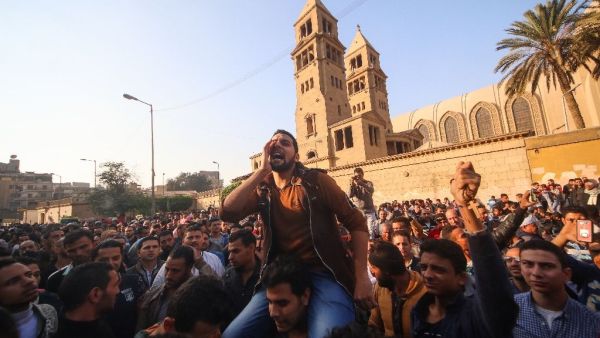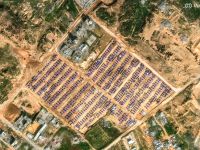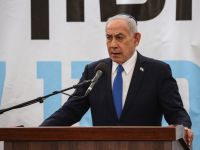The bombing that killed 23 people during Mass in a church adjoining Cairo's main cathedral was a suicide attack, President Abdel-Fattah al-Sissi said on Monday during a military funeral ceremony for the victims.
Three other suspects in Sunday's attack, for which no group has as yet claimed responsibility, were being interrogated, al-Sissi said in a surprise announcement.
He named the suicide bomber as Mahmoud Shafiq Mohammed Mustafa, who was 22 years old. Officials and survivors of the attack had earlier told local media that a bomb appeared to have been placed inside the Botrosiyya church beside Saint Mark's Cathedral.
On the first of three days of official mourning for one of the worst ever attacks on Egypt's Christian minority, Pope Tawadros II of the Coptic Orthodox Church celebrated funeral Mass for the victims at a church in eastern Cairo.
Hundreds of mourners stood outside holding large crosses. Local newspaper al-Masry al-Youm reported scuffles between angry Christian youths and police outside the church, which was open only to the families of the victims.
With the coffins of the victims arrayed before the altar, Pope Tawadros called for national unity, saying in a quavering voice: "We know that whoever has done this does not belong to Egypt, its history or its civilization."
"The Egyptian people do not know violence or terrorism. But there are other martyrs other than those to whom we bid farewell today," the Coptic Pope added, saying the bombing was an attack "against the nation."
A procession of ambulances then bore the remains slowly towards the nearby Tomb of the Unknown Soldier, where state dignitaries were waiting for the military ceremonies.
Military police bearing wreaths marched in front of colour parties bearing the coffins, draped in Egypt's black, white and red flag.
Al-Sissi walked behind, flanked by Pope Tawadros and former president Adly Mansour, at the centre of a procession of mourners. The slain then made their final journey to a Christian cemetery on the eastern fringes of the Egyptian capital.
Pope Francis earlier called his Coptic counterpart to offer his condolences, the Vatican press office reported.
Francis told Tawadros he was going to dedicate special prayers to the Coptic community during a Mass he was to lead in St Peter's Basilica later on Monday.
"We are united by the blood of our martyrs," the pontiff said to his fellow Christian leader.
The bombing of the Botrosiyya church is the worst attack on a Christian place of worship in majority Muslim Egypt since a New Year's Eve 2010 blast at a church in the northern city of Alexandria killed 23 worshippers.
Egypt has seen repeated attacks by suspected Islamist militants since 2013, when the army deposed Morsi, the country's first democratically elected leader, following mass protests against his divisive rule.
In the immediate aftermath of Morsi's overthrow, dozens of Christian churches and other properties were also torched during angry protests.
Most of the attacks since then have targeted police and security forces.
Christians are thought to make up about 10 per cent of Egypt's 92 million population, although no official figures are available.
Christians staunchly backed Morsi's toppling by the then army chief Abdel-Fattah al-Sissi, currently Egypt's president.
However, many have since grown disillusioned as al-Sissi has so far been unable to address either the country's economic woes or Christian complaints about discrimination, sectarian violence in rural southern Egypt, and difficulties building churches.








